
Contents: Top Oceanica’s Newest Program: “Transects” We’ve just completed the third leg of our new program called Transects. The Transects Program <http://oceanica.cofc.edu/Transects/home.htm> is funded by the National Science Foundation’s Geoscience Education Program. Leslie Sautter and Gorka Sancho (Biology Dept., College of Charleston) are the co-Principal Investigators of the two-year program. ‘Transects’ is designed to immerse and engage undergraduate students in oceanographic research by taking them to sea to collect biological, physical and geological samples that they will later analyze in the laboratory.
While at sea, the students work 8-hour shifts around the clock, employing a wide range of oceanographic equipment to sample the sea floor sands, the organisms living on the bottom and in the surface waters, and the ocean water itself. ‘Graduates’ of previous legs sail as “watch chiefs,” teaching and supervising the first-time students. “The students are amazing,” Sautter commented. “After only 24 hours they understand the basics of the sampling process and take control of the entire operation. All Gorka and I have to do is direct traffic and oversee the sampling.” All students work in collaborative teams to get the job done efficiently and safely. “They leave the dock as students and returned as ocean scientists,” Sautter adds. Along with the collection of sediment and marine organisms, students sample the water from the surface to the seafloor and measure its chemical and physical characteristics. They are also able to work with state-of-the-art seafloor mapping technology (side scan sonar and sub-surface seismic profiling), provided by Coastal Carolina University. These instruments send out pulses of sound that are reflected off the surface and sub-surface of the seafloor, creating an image on a computer screen. On legs 01 and 02, use of a remotely operated vehicle (ROV) was generously provided by Andrew Shepard of the NOAA National Undersea Research Center at UNC-Wilmington. Students were able to “drive” the ROV and capture hours of video footage of the seafloor at depths between 20 and 50 m. Following the cruise, students must enroll in Sancho’s and Sautter’s semester-long course, “Oceanographic Research.” They analyze most of the >200 samples collected at sea, while conducting individual research projects. By the semester’s end each will present their results in a public forum and write a research manuscript. Student research results will later be posted on the Project Oceanica website at http://oceanica.cofc.edu. Sancho emphasized that, “Our objective is to prove that students can collect, process, and analyze research-quality data while they learn oceanography first-hand.” An inventory of the data and samples collected will be posted on the website on a growing database for anyone to use for educational or scientific purposes.
Top
From August 20 – September 1, 2004, Oceanica director Leslie Sautter joined scientists from SC Dept. of Natural Resources, NOAA, and various universities for a submersible expedition aboard the R/V Seward Johnson II. During this expedition, scientists worked along a "Latitude 31-30 Transect" line that extends from the coast of Georgia to the deep sea. The focus of the expedition was on deeper waters of the Blake Plateau (400 to 1000 m), to complement previous studies of shallow-water faunas. The goal was to extend the scientists’ knowledge of seafloor faunas from the estuary to the deep sea. They examined changes in benthic habitats that occur with increasing depth and distance offshore. Exploration along this transect will help scientists understand the influence of depth, distance from land, habitat physical characteristics and overlying water masses on the communities of organisms that dwell on the seafloor. For more information on this expedition
and to view the web-related resources, visit http://oceanica.cofc.edu/EstuaryToAbyss/home.htm Top Gray’s
Reef National Marine Sanctuary Expedition Gray's Reef is one of 14 National Marine Sanctuaries in the United States. It is located 20 miles offshore of Sapelo Island near Savannah, Georgia and is managed by the National Oceanic and Atmospheric Administration (NOAA). Gray's Reef is an area that consists of 58 square kilometers (17 square nautical miles) of a "hard bottom" (or "live bottom") reef system. In fact, it is one of the largest near shore live-bottom reefs of the southeastern United States. The mission of this survey was to utilize a variety of instruments and methodologies to learn more about the kinds of fish in the area, as well as the environments that they live in. In addition, the new data that were generated as a result of this research will be compared to historical records so that temporal change may be assessed. Top 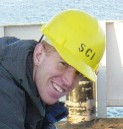 Our New Staff Members
Our New Staff MembersTrent Tinker is originally from Myrtle Beach, SC. He is currently a senior at the College of Charleston majoring in Computer Science with a minor in Geology. He has been the Education Technology Specialist (webmaster) for Project Oceanica since May 2004. After graduating, Trent wants to combine his interests of computers and geology to pursue a job in the field of GIS (Geographic Information Systems).  Sarah
McGuire is originally from Wilson, NC. She graduated with a B.S.
in Biology from East Carolina University in 2003, then worked for Mote
Marine Laboratory teaching marine science camp to middle school and high
school students. Now, Sarah is working on her Master's degree in the Masters
of Environmental Studies Program at the College of Charleston, and will
finish up in May 2005. She has been working with the COASTeam Program
since fall 2003, first as a volunteer, then as a graduate intern, and
now as the Program Manager. After completing her Masters degree, Sarah
wants to combine her interests working with middle and high school students
with her interests in marine biology to work in the marine education field. Sarah
McGuire is originally from Wilson, NC. She graduated with a B.S.
in Biology from East Carolina University in 2003, then worked for Mote
Marine Laboratory teaching marine science camp to middle school and high
school students. Now, Sarah is working on her Master's degree in the Masters
of Environmental Studies Program at the College of Charleston, and will
finish up in May 2005. She has been working with the COASTeam Program
since fall 2003, first as a volunteer, then as a graduate intern, and
now as the Program Manager. After completing her Masters degree, Sarah
wants to combine her interests working with middle and high school students
with her interests in marine biology to work in the marine education field.
Top Sea Turtle Video Gallery Top Microfossil ID Gallery Top At Sea! Program Update
At Sea! 2004 – 2005 - Oceanica held 4 At Sea! cruises from November 1-3. These cruises, aboard the NOAA ship Nancy Foster included students and teachers from the following high schools: Wando, West Ashley, James Island Charter, James Island Christian, North Charleston and Fort Dorchester. Undergraduates and graduate students from College of Charleston and University of South Carolina also participated. The next At Sea! cruises are scheduled for January 20 and 21 of 2005. There are still spaces available on these two cruises. Please contact Rachel McEvers mceversr@cofc.edu for information. New At Sea! web products - Photo galleries from the most recent legs have been posted to the web site http://oceanica.cofc.edu/atsea/ and data from all the legs should be updated by early January. Top COASTeam Update COASTeam Leadership Institute
- Oceanica (Leslie Sautter and Jennifer Jolly Clair as the co-Principal
Investigators) was awarded a 2-year grant from the SC Sea Grant Consortium
to offer a new program called the COASTeam Leadership Institute. Sarah
McGuire, Rachel McEvers, Jennifer Jolly Clair and Leslie Sautter are
developing the curriculum for the first Leadership Institute that will
be offered in the Spring and Summer of 2005. The curriculum is based
on the text, Of Sand and Sea (written by P. Keener-Chavis and L. Sautter)
and will be geared toward grades 5-8. The curriculum is aligned with
the SC science standards and the national science standards. We are
partnering with the SouthEast Center for Ocean Sciences Education Excellence
(SE-COSEE) to offer the workshop to informal educators and teachers
in North Carolina, South Carolina and Georgia. The informal educators
and teachers will collaborate to take this new found knowledge back
to their institutions and offer “COASTeam Days” to train
more educators. More information about this program will be forthcoming
to teachers and informal educators. Top How Can I Learn More?! Oceanica is constantly involved in fun, exciting and educational opportunities all over the southeast. We are growing each week! Please join us on our journeys whether it’s in person or through our many web resources and products. If you are an educator, please let us know if and how you utilize our web site and resource products in your own curricula. If you are interested in publishing lesson plans (pre-college educators) or laboratory/lecture classroom exercises (college faculty) on our site, please contact us! The website is always growing and changing so make sure to visit often, and please tell your friends and colleagues to visit! If you want more information on any of our projects don’t hesitate to contact us at oceanica@cofc.edu Thank you so much for your support and interest. We’ll continue to keep you posted on upcoming expeditions and new web pages.
|
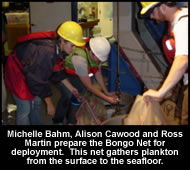 To
date, 38 students (31undergraduate and 7 graduate student mentors) have
sailed on one of three cruises (“legs”) aboard the 92-foot
research vessel Savannah (operated by the Skidaway Institution of Oceanography).
The cruises took place in Nov. 2003, May 2004 and Nov. 2004, with the
next cruise scheduled for May 2005. Each cruise lasts for five days
and includes sampling at 20 stations on the continental shelf between
Charleston and the Gulf Stream, 60 miles from shore. Also participating
have been visiting scientists from Coastal Carolina University (Dr.
Scott Harris and Jamie Phillips) and University of South Carolina (Dr.
Steve Stancyk).
To
date, 38 students (31undergraduate and 7 graduate student mentors) have
sailed on one of three cruises (“legs”) aboard the 92-foot
research vessel Savannah (operated by the Skidaway Institution of Oceanography).
The cruises took place in Nov. 2003, May 2004 and Nov. 2004, with the
next cruise scheduled for May 2005. Each cruise lasts for five days
and includes sampling at 20 stations on the continental shelf between
Charleston and the Gulf Stream, 60 miles from shore. Also participating
have been visiting scientists from Coastal Carolina University (Dr.
Scott Harris and Jamie Phillips) and University of South Carolina (Dr.
Steve Stancyk). 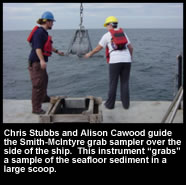
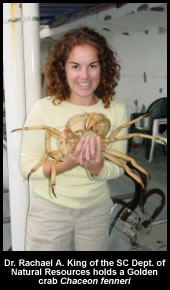 Our
Most Recent Ocean Exploration Expedition: “Latitude 31-30: Estuary
to the Abyss”
Our
Most Recent Ocean Exploration Expedition: “Latitude 31-30: Estuary
to the Abyss”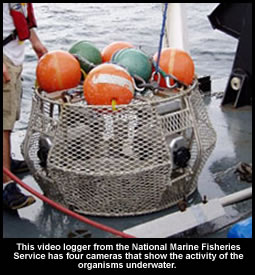 Elizabeth
Rogers, a graduate student at the College of Charleston, was selected
by Project Oceanica as the Science/Education Liaison to work aboard
the NOAA Ship Nancy Foster in Gray's Reef Marine Sanctuary from May
10-20th, 2004 off the coast of Savannah, GA. Elizabeth sailed with scientists
from NOAA, NASA, SC Department of Natural Resources, University of Georgia,
and other agencies. Her main objective was to write daily logs science
being conducted on the cruise (mainly fisheries research), targeting
high school and undergraduate audiences. These logs were sent to Oceanica
each day of the cruise via email and were quickly posted on the web.
Elizabeth
Rogers, a graduate student at the College of Charleston, was selected
by Project Oceanica as the Science/Education Liaison to work aboard
the NOAA Ship Nancy Foster in Gray's Reef Marine Sanctuary from May
10-20th, 2004 off the coast of Savannah, GA. Elizabeth sailed with scientists
from NOAA, NASA, SC Department of Natural Resources, University of Georgia,
and other agencies. Her main objective was to write daily logs science
being conducted on the cruise (mainly fisheries research), targeting
high school and undergraduate audiences. These logs were sent to Oceanica
each day of the cruise via email and were quickly posted on the web.
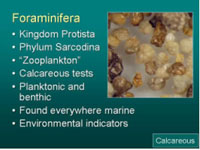 Our webmaster, Trent Tinker, worked with Leslie to create an incredible
microfossil identification gallery. The gallery was developed to assist
students and educators with recognizing and identifying the wide variety
of microfossils found in marine sediments. It is a good reference for
examining the fossils found in sediments from the Charleston Bump, collected
at about 1600 feet. These sediments have a composition that is almost
entirely biogenic – they are incredibly interesting! You can request
a sample of this sediment for use in your classroom. The sediment repository
page
Our webmaster, Trent Tinker, worked with Leslie to create an incredible
microfossil identification gallery. The gallery was developed to assist
students and educators with recognizing and identifying the wide variety
of microfossils found in marine sediments. It is a good reference for
examining the fossils found in sediments from the Charleston Bump, collected
at about 1600 feet. These sediments have a composition that is almost
entirely biogenic – they are incredibly interesting! You can request
a sample of this sediment for use in your classroom. The sediment repository
page  transportation
and lodging and NOAA donated the ship time aboard the Nancy Foster.
This enrichment experience was a reward for 3 of the finalists (whose
projects are related to NOAA science) from around the country. This
offered them an opportunity to get on board a research vessel and do
something marine science related. High School students from North Charleston
High School and several College of Charleston undergraduates also participated
in the cruise.
transportation
and lodging and NOAA donated the ship time aboard the Nancy Foster.
This enrichment experience was a reward for 3 of the finalists (whose
projects are related to NOAA science) from around the country. This
offered them an opportunity to get on board a research vessel and do
something marine science related. High School students from North Charleston
High School and several College of Charleston undergraduates also participated
in the cruise.